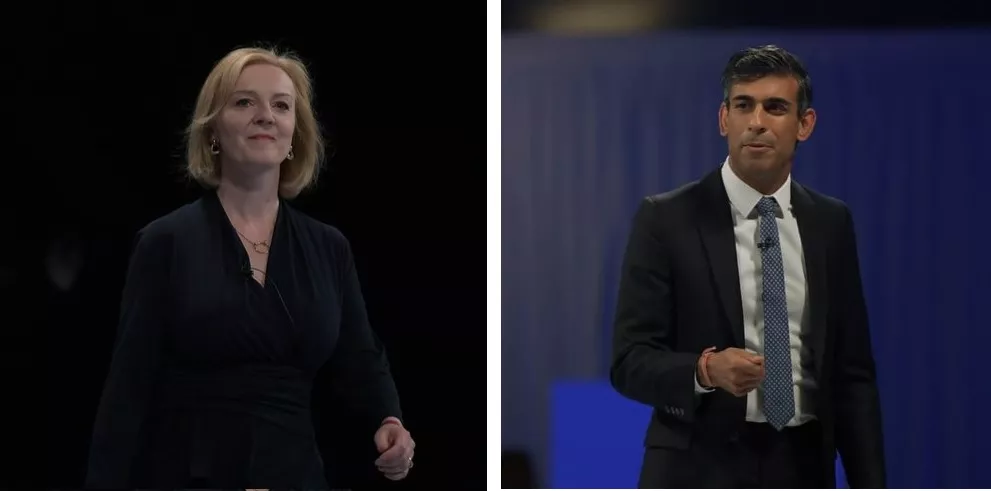
The UK desperately needs cheap, clean energy, home insulation and real leadership on the climate and cost of living crises. But based on the showing of the two candidates to lead our country, we won't be getting it any time soon.
At a recent Conservative leadership hustings, Liz Truss promised to change the rules to ensure farming is prioritised over new solar projects. She also vowed to exploit all the gas in the North Sea and said she would allow fracking in locations "where communities supported it".
Rishi Sunak has already indicated his own opposition to the most cost-effective, clean energy, saying he would restrict solar development on farmland and reverse proposed moves by the government to lift the block on onshore wind farm development in England.
Truss also repeated her pledge to suspend 'green levies' on energy bills, despite experts warning that this would save an average household just £150 off their annual bills. Neither this, nor Sunak's pledge to suspend VAT on household energy bills, even scratches the surface of this crisis with rising fossil fuel prices sending average bills to over £3000, and the cost of living rising much faster than wages.
Both candidates have expressed a lukewarm commitment to the UK's legally binding target to reach 'net zero' emissions by 2050. Truss said we needed to find "better ways to deliver net zero" that won't "harm people and businesses", and Sunak warned "If we go too hard and too fast then we will lose people."
At a time when other European countries are pushing to reduce their gas dependency, and just two weeks after the UK's record-breaking 40C heatwave, it seems surreal that the candidates to be the UK's Prime Minister fail to grasp what is at stake.
In this energy crisis, it makes no sense at all to rule out energy sources which are not only cheap and clean, but can also have a quick impact: a new wind farm can be up and running within weeks once construction starts.
What's behind this wilful blindness on climate? Is it that they believe this stance will be popular electorally with Conservative voters? A survey in April found that 80% of Conservative voters surveyed supported onshore wind expansion in general, with 72% supporting new onshore wind 'in my area'.
Recent polling also found that less than a quarter of Conservative voters opposed the UK's net zero target, believing it should either be later than 2050 or should be scrapped, compared to almost three-quarters who believed we should aim for net zero by 2050 or even sooner (data p36). Meanwhile, another poll found around a third of Tory voters did not support net zero, But this research also found that supporting net zero and renewable energy is an electoral asset in marginal constituencies and among undecided voters. And there is widespread public support for home insulation as a key measure to improve the UK's energy security.
Of course, in this leadership election, only Conservative members will have a vote, and they place a lower priority on tackling the climate emergency than the wider population. But they are certainly not against green policies which lower bills: both wind energy and home insulation support are popular.
Truss and Sunak also needed to woo Tory MPs, 9% of whom don't even believe there is scientific consensus on climate change. That will have an impact, although not all Conservative MPs are so ignorant: for example over half of them did agree that a green recovery from Covid should be a priority.
In the 'energy strategy' earlier this year, in the spring Budget, as well as in this current leadership contest, popular and practical policies like home retrofitting, wind power and solar were almost entirely absent, in their place, major tax incentives for North Sea oil. A strong case is made here for taking a hard look at the role of media oligarchs in driving government policy. Because they desire positive media coverage, Prime Ministers (and those who want to be Prime Minister) may be directly influenced by editorials calling for the return of fracking. Importantly, this can happen even if those editorials don't have much impact on public opinion.
And of course, behind closed doors, there are corporate fossil fuel lobbyists and donors with the kind of access to decision-makers that the fragmented home retrofitting sector can only dream of.
Whoever wins the race to be Prime Minister will face a winter of crisis with spiralling fuel poverty and industrial action as workers fight wage suppression. And a global reality in which gas prices are not going down any time soon and the window to avoid climate catastrophe is rapidly closing. Public demand for action is not going to let up.
Photo credits: Conservative Party via Flickr




